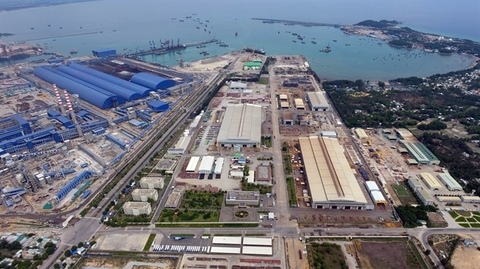Coastal economic zones need breakthrough policies to attract investment
Coastal economic zones need breakthrough policies to attract investment
Coastal economic zones need breakthrough policies to attract investment and promote their role in accelerating socio-economic development.

A view of Dung Quất Economic Zone. There are 19 coastal EZs in Việt Nam, 11 of which are in the central part of the country. — VNA/VNS Photo Danh Lam |
Statistics from the Ministry of Planning and Investment show that there are 19 coastal EZs in Việt Nam, 11 of which are in the central part of the country.
Coastal EZs have contributed significantly to the region’s socio-economic development but there exist limitations which must be tackled comprehensively to make coastal EZs a driving force for regional development.
According to Hoàng Hồng Hiệp, acting Director of the Institute of Social Sciences of the Central Region, the institutional framework and development model of coastal EZs are still incomplete.
The infrastructure system inside and outside the zones has not been invested synchronously with limited connectivity with regional economic centres.
Projects in these coastal EZs are mostly in light and labour-intensive industries such as textile, footwear, and assembly while there is a lack of investment projects in industries and services using high technology.
Hiệp added that policies designated for coastal EZs to attract investments were still not favourable enough, making it difficult to attract foreign investment and direct investment in tackling social issues at EZs, such as education and training, social security, social welfare and housing for workers.
Some coastal EZs were even struggling with attracting investment, resulting in the mindset of attracting investments at all costs without paying attention to environment and ecology protection, he said.
“In the context that the central part of Việt Nam is facing strong impacts of climate change, marine environmental pollution incidents coupled with post-COVID pandemic difficulty, especially when the Government is developing planning for the region, it is necessary to review the investment influx into the coastal EZs and raise policies to promote their development towards sustainability,” Hiệp emphasised.
Bùi Quang Bình from Đà Nẵng University of Economics said that the Government was drafting the planning for the North Central and Central Coast regions in 2021-30 period with a vision to 2050.
Bình said the planning should thoroughly define the role of coastal EZs in the region’s socio-economic development.
“Innovation is important. The planning of coastal EZs should be integrated with the planning of the national marine space and other regional and provincial planning,” he said.
A strong legal framework for coastal EZs was needed to ensure their development is synchronous and sustainable, he said, adding that policies should be raised to further attract private investments in coastal EZs.
The Government should give priority to investing in coastal transport infrastructure, infrastructure of EZs, national port system, human resource development and environmental protection, Bình stressed.
Lê Văn Hùng from the Institute of Regional Sustainable Development, said Việt Nam should study policies to promote the development of groups of EZs which would enable to focus resources on improving the infrastructure system, social services and ecological environment protection to create sustainable coastal EZs.
Coastal EZs should go green and specialise in a specific group of industries, Hùng said.
According to Lê Minh Dương from the Investment Promotion Centre, South Việt Nam, localities should improve the efficiency of investment promotion for EZs with a focus on attracting strategic investors, multinational corporations with high and clean technologies to participate deeply in the global value chain.
Besides, it is necessary to promote the development of part-supplying industries to create a tight and cohesive ecosystem with FDI companies.
Dương cited statistics that coastal EZs in the central region attracted around 500 projects with a total registered capital of US$38.67 billion, or 60.5 per cent of the total registered investment in the region which runs from Thanh Hoá to Bình Thuận.
Average investment was $77 million per project, 2.6 times higher than the average level of the central region.



























